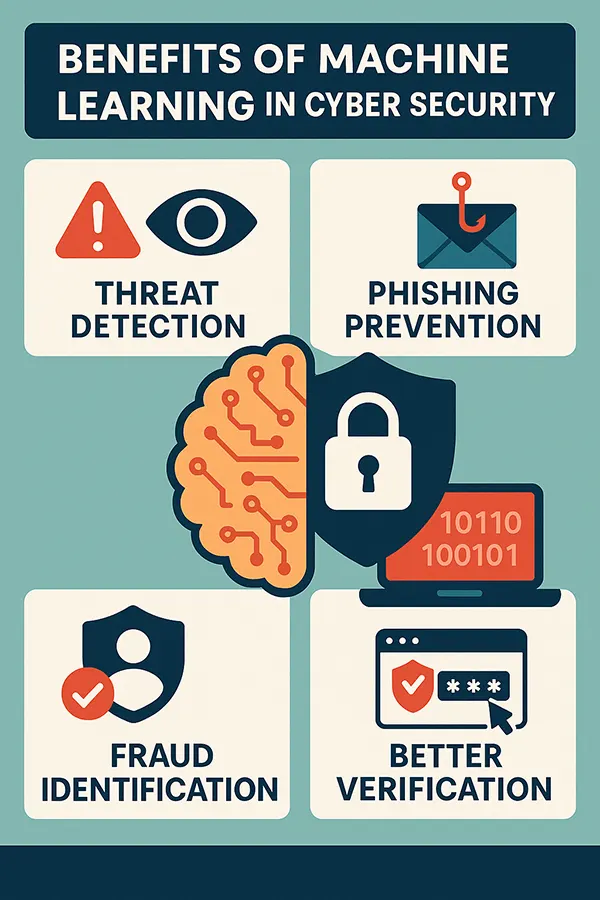AI algorithms and ML have advanced capabilities that can easily detect threats and eliminate them instantly before they can cause any damage.
KEY TAKEAWAYS
- ML easily recognizes patterns from past data.
- AI tracks all the networks and looks for abnormalities.
- Autonomous defense systems don’t require human guidance.
- Cyber threats can also evolve using the same AI capabilities.
Cybersecurity has become one of the major concerns for all organizations. This is because over 600 million cyberattacks happen every day around the world. However, as the technology advances, we have new ways to fight against these threats, and one of those is AI.
AI has now been incorporated in all the fields, take Viva AI for example which is meant for dental appointments. AI has become a major part of cyber defense as it is capable of fighting and eliminating all types of cyber threats. It is now playing a significant role in cybersecurity and is being trusted by people across the globe.
With that being said, in this article, I’ll mention AI’s growing role in cyber defense. Let’s get started.
The traditional methods that were being used are cybersecurity are no longer effective as cyber threats have evolved significantly. Nowadays, they only get detected after the system has been breached, and major damage has been done.
However, AI doesn’t work like that; it keeps on monitoring all the networks and tracks abnormalities. It can even flag potential threats before they do any harm. Security teams can now predict if any attack is going to happen and plan things accordingly.
This is because AI-based tools consider past data and can greatly learn from it. They help identify vulnerabilities and unusual, suspicious patterns. Since you’ll already be aware that something might happen, you’ll be prepared and save your organization from legal or financial troubles.
When AI is mentioned, ML (machine learning) is also talked about, as it is a key part of artificial intelligence. ML empowers cyber defense systems with pattern recognition and behavior analysis. The best part is that its database comes trained.
This means it is already aware of malware signatures, phishing schemes, and system logs. It can differentiate between normal activities and potential threats. ML is known for adapting and evolving with the latest data, unlike static-based systems.
Machine learning can accurately identify zero-day vulnerabilities and unknown malware strains, which is a must in today’s landscape, where attacks can happen at any minute. Since machine learning analyzes user behavior, network traffic, and file movements, it can detect threats and stop them right away. It can also perform sentiment tracking with the help of ML and NLP.
Below, you can see the benefits of ML in cybersecurity.

An autonomous defense system (ADS) is no less than a guardian angel. It involves AI-based agent that are capable of doing things on their own. They will do all the research, look for threats, and eliminate them all without any human involvement.
These systems leverage machine learning and deep learning because of the complexities that come with cyber threats, which also enables them to counterattack in real-time. In this fast-paced world, this is a necessity.
However, there’s a downside as well, since ADS and other such systems can get rid of threats, they are also trying to evolve using the same technologies. That’s why it’s important for you to go for other measures that will strengthen your infrastructure.
While on the surface it may look perfect and flawless, AI-powered security does come with several challenges and ethical dilemmas. This includes:
These are just some challenges; there are even more. It’s your duty to keep it in check and see if it is working fine or not.
It’s safe to say that modern cyber defense technology is going to heavily rely on AI. That’s because it is capable of fighting against them. While there are certain vulnerabilities, they can be worked on as AI is still undergoing a lot of changes.
Threats are also rising to greater heights by using the same technology, and it’s turned into a digital battlefield. But, given the stats, an AI-based security system will come out victorious as it learns things on its own.
DID YOU KNOW?A report from 2024 mentioned that the average cost of a data breach can go up to $4.88 million!
AI is playing a significant role in cyber defense, making it robust so that it can fight against any type of cyber threats. Companies are considering it an important investment that can’t be avoided.
You should keep this in mind if any organization gets breached or any such thing happens, they will be facing financial and legal issues. Apart from that, their reputation will also be tainted.
AI algorithms and ML have advanced capabilities that can easily detect threats and eliminate them instantly before they can cause any damage.
Attackers can also use AI to strengthen their attacks, that why organizations need to improve other areas as well. This includes staff training, regular updates, strong authentication, and AI security systems with multiple layers.
AI is known for assisting professionals with understanding complex data patterns, and giving recommendations on what can be done. It also has its own security system that keeps cyber threats at a distance.
